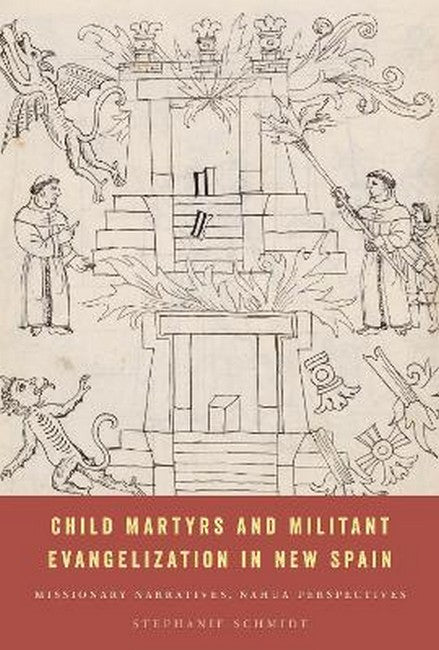Stephanie Schmidt is an associate professor in the department of Romance Languages and Literatures at the University at Buffalo (SUNY).
Request Academic Copy
Please copy the ISBN for submitting review copy form
Description
List of Illustrations Introduction 1. The Nahuatl Vida de Tres NiNos Tlaxcalecas: Christian Hagiography, Nahua Perspectives 2. Cristobalito and His Father, Acxotecatl 3. The Child Martyrs of Tlaxcala: Lordly Warriors, Christian Exemplars 4. Child Converts as Christian Militants, Friars as Men at War Conclusions Acknowledgments Notes References Index
Through an incisive, stimulating, and enterprising analysis of Nahuatl-language manuscripts and other sources, Child Martyrs and Militant Evangelization in New Spain breathes new life into a canonical martyrdom account embraced, but also strategically repurposed, by missionaries and ecclesiastics to depict Indigenous Christianity in the early Americas. - David Tavarez, Vassar College, editor of The Oxford Handbook of Ritual Language, author of Rethinking Zapotec Time Drawing on Nahuatl language sources and accounts from early missionaries, Stephanie Schmidt offers a nuanced analysis of the use of children in the early Franciscan missionary activities in Mexico. Using the account of the child martyrs of Tlaxcala, she probes the mentality of the friars as she considers opposing views such as that of the jurist and chronicler Alonso de Zorita. This is an excellent work that analyzes a critical aspect of the early evangelization of New Spain. - John F. Schwaller, University at Albany (SUNY), author of The Stations of the Cross in Colonial Mexico: The Via crucis en mexicano by Fray Agustin de Vetancurt and the Spread of a Devotion With increasing frequency and effectiveness, scholars of early colonial Mexico are reinterpreting the history of contact through careful translation and analysis of Native-language documentation. Stephanie Schmidt's engrossing study makes a new and insightful contribution to this critical turn. By calling attention to a little-known manuscript copy of a lost Nahuatl account of the killings of three Nahua youths in the 1520s, Schmidt effectively recontextualizes critical events in the early history of the church in Latin America. Her analysis superbly teases out the ways the text's Nahua authors subtly injected Native perspectives, softened certain aspects of the better-known Spanish account, and couched the Christian message in language that would have been familar to and respectful of the ancestral traditions of the text's Native audience. Schmidt's skillful analysis testifies to the importance of Native-authored testimonies dating to the contested early moments of first contact. - Ben Leeming, independent scholar, author of Aztec Antichrist: Performing the Apocalypse in Early Colonial Mexico

